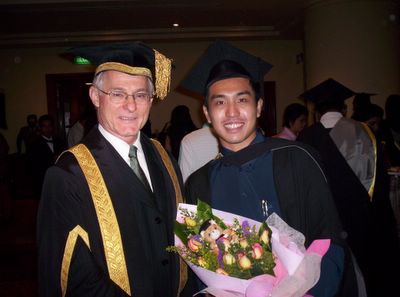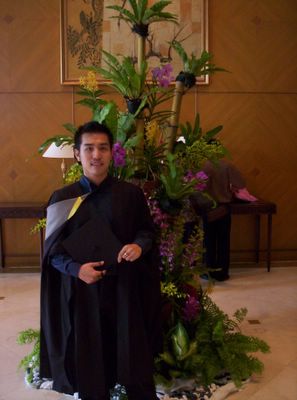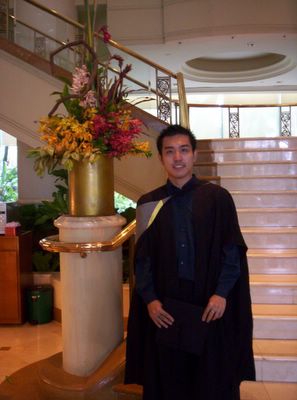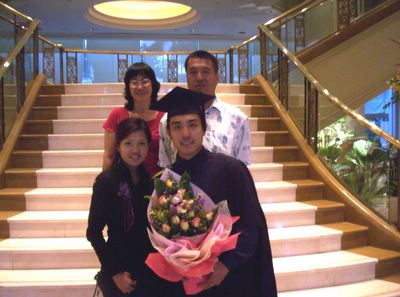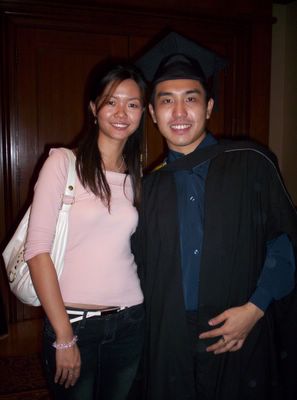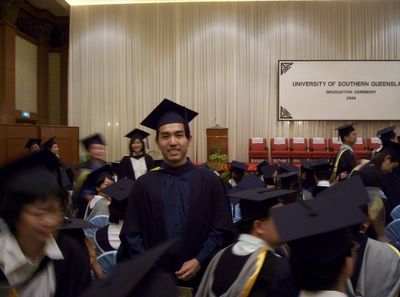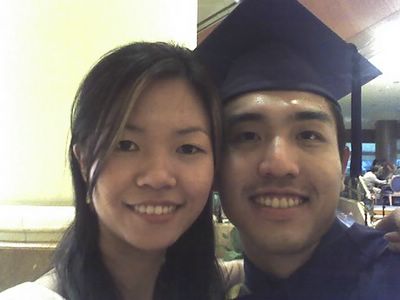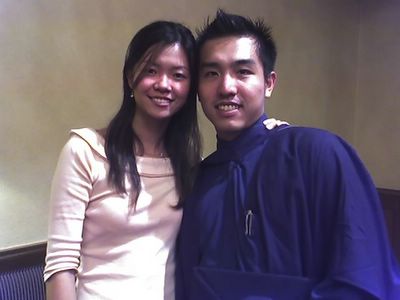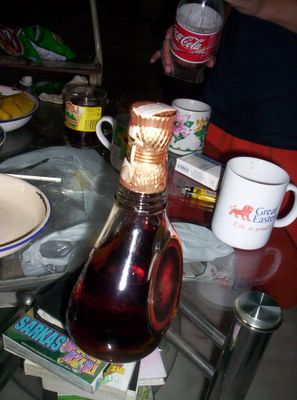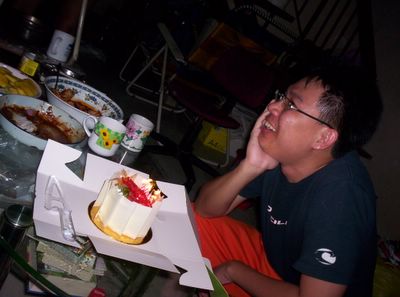University Malaya is proclaimed as one of the best University in Malaysia, but the sluggish service is a bit turn-off at the moment. I had a pretty bad experience recently when I called for enquiry.
I called up the faculty of business a few days back to ask for Dr. Sharifah, who is the dean of business faculty. The lady in the phone reprimanded me for not calling the correct number, and asked me to call another extension. I asked if she can help to transfer, but she said she cannot transfer call internally. She gave me the number then, 03-79676 3981.
Unwillingly, I redial the new number. Another lady picked up my call, but unfortunately Dr. Sharifah was not around at the moment, so I was asked to call back after 15 minutes.
I waited 15 minutes, and called the number the lady gave me earlier; and a lady picked up my call. I can recognise the voice as coming from the same lady who I have spoken to in my second call.
I asked for Dr. Sharifah, but she reprimanded me again, saying that I should call another number. I told her that I have called the number given to me earlier, but she insisted that I should call the other number, and so I asked for the number again.
She uttered, ‘you should call this number -03-7976 3981’
‘Yes, this is the number I called’, I answered.
‘Which one is the correct number now? I have called the number you gave me earlier though’, I explained.
She puzzled, and answered, ‘Oh, yes, it is this phone. The person in charge is not around; you may call back after 5 minutes’
Friday, March 31, 2006
Prince: Pre-School Education Industry
The future of the pre-school education industry in the next five or ten years – one is tempted to say the market will be saturated, fragmented, and run mostly by individual on the basis of sole-proprietorship. This is because the industry is less-regulated by the government, and any Tom, Dick and Harry with a diploma in Montessori teaching will be able to start their own kindergarten somewhere within the residential areas. All it requires is a small start-up capital. With the growing number of converted corner-house into kindergartens in the market, eventually, they will have to fight for the dwindling market share with smaller portions among shareholders.
One must understand that the essence of a kindergarten business is no longer about child play, but it is about providing quality pre-school education. The young and emerging executives in Malaysia are brought-up with different family-value under the society, and the trend in this society puts parental planning importantly, hence the fewer off springs. The urge towards setting-up small family has led to the growing parental concern on their children’s education, and for this reason, parents are becoming demanding and pushy with their child’s interest.
Nowadays, parents are better-paid and have more saving with fewer children in the family. They are willing to enrol their kids in luxurious-kindergarten with better teaching qualities and for the better environment for children developmental needs. Some parents are already paying as much as RM 1,000 monthly for a half-day program in kindergarten. Unfortunately, there are only a number of ideal-kindergartens around, and those kindergartens are yet considered as providing the best quality.
‘Kindergartens no longer able to sustain with routine-marketing-activities, they need to change’
The marketing gimmicks for kindergarten are remarkably predictable. They often engaged in routine marketing activities such as open day, banner advertisement, and brochures distribution while established kindergartens such as Smart-Readers and Q-Dees will leverage on economies of scale to invest in newspaper advertisement. Nevertheless, most kindergartens are engaging in passive marketing activities; it is a passive branding approach. Some kindergartens believe that branding is achievable when the products enjoy a significant presence in the market for a long duration; that time is the factor, thus, requires neither creativity nor innovation for these branding activities.
Parent loyalty is nurtured through the relationship of the principal with parents. The way the relationship is bridged is called the ‘principal-parent-relationship'. It is the personal relationship of the parents with principal alone. However, with the ability of the principal alone, it is impossible to serve every parent.
Kindergartens lack of the knowledge to build strategic response to face the changing demography, and their shallow marketing and management knowledge does not make any significant contribution to the recruitment and branding activities, as well as to the whole kindergarten industry.
‘Kindergartens need to move toward corporativism’
There are hundreds of kindergartens locked in the markets, whose operation is still described as ‘individually-approach’. It is still a long way for the industry to move toward ‘corporativism’. For kindergartens to outperform competitors, they cannot rely solely on routine marketing activities alone, but also areas to build their internal-strength. There are a few areas which a kindergarten can improve to create competencies, and most importantly, becoming the market leader.
‘Service Quality is your competency’
Organizations are looking forward to transform their services into one of their competencies because they believe that service quality is one of the criteria to becoming a successful organization. Similarly, Kindergartens should improve their service quality because tip-top service quality allows kindergartens to market their product more effectively, and to be outstanding among the competitors, most crucially, it ensures parent-children satisfaction.
Quality service means responding to parents’ enquiry and complaint tactfully within a certain timeframe. Kindergarten can create positions such as a Parent Liaison Officers, whom take responsibilities to communicate with parents and becoming a bridge between the academic team and parents. Parent Liaison Officers can eventually help to give constructive comments to improve academic standards based on their understanding of parents’ need.
Children are the end-users whom emotions and moods are deeply associated with kindergarten. Therefore, at the end of the day, children are the reflection of your quality. With this, kindergartens must ensure that children are happy, safe and healthy in the campus, i.e., the food provided must be under strict nutrition control and the campus must be able to ensure children’s safety with constant monitoring through CCTV.
‘Strong Academic Team strengthens your market position’’
Kindergartens cannot be competitive without a strong academic team. The academic team is the heart of kindergartens and it helps to produce the desired results. Not forgetting children are the product, and that quality refers to the ability of children to read and write well, thus, a good academic team contributes to quality product, and kindergartens can compete remarkably well if the academic team do markedly better.
Kindergarten is an educational service, which requires human capital. They must ensure employees are satisfied with the organization in order to have high degree of parent-satisfaction. Kindergartens can introduce share-ownership or partnership program as one of the employees’ retention strategy. They can also create the position of ‘Vice Principal Trainee’ to train the teachers for future expansion needs; in addition, it is also part of career advancement pathway for teachers.
HR function also plays an important role in determining the quality of the academic team. They need to be more cautious in recruitment services, and set minimum criteria for recruitment function to perform effectively. It is also crucial for kindergarten to improve their productivity through extensive training to get the most out of each and every academic staffs. Kindergarten should also provide continuous training to enhance their knowledge in customer service, childcare skill and classroom management skill.
‘Economies of Scale rely on the size of Kindergarten’
‘Size does matter’, of course, you cannot expect children to grow up in a confined environment. The campus environment must be conducive. Furthermore, bigger kindergartens can leverage on their economies of scale, and it determines the number of children that can be recruited.
‘Parent-Children Relationship Management & Online CCTV’
Investment in computer system is a must to ensure smooth flow of day-to-day operation. Kindergartens need a computer-system that is able to access by every department for different purposes.
For example, Administration department can use the system to record children data such as allergy, personal doctor or family contact number; Account and Finance Department can utilize the system to check transaction and payment history; Marketing department can use the system for direct mailing and performing parent-children profiling; while Academic team can provide constant update on children performance through the system. Upon emergency, system can also help to swiftly look up on the children information.
In addition, the system must be able to integrate with kindergarten web-system to allow parents to access to their children record-book online. Kindergartens can also invest in online CCTV as a value added services for parents; parents can then log in with their password and user name to observe the teachers conducting the class.
‘The Business Model marks the difference between Coffee Bean and Traditional Coffee Shop in the market’
There is a different if you compare Seven-Eleven outlets with the traditional grocery store around the corner. They may be selling the same groceries in the shop but with different brands, and most crucially, Seven-Eleven is able to expand in quick-pace.
This is attributing to the good business model. Seven-Eleven is adopting a model called the ‘Retail Business Model’. Another good example; you can expect the same service, product and design in every McDonald outlet. It is neither Machine nor ‘Ronald McDonald’! It is because they have the business-model! McDonald planted their model from outlet to outlets, creating the similarity and standardization in each outlet.
Similarly, Kindergartens need to have a business model for expansion and move forward to becoming a corporate entity. They can start with designing policy handbook, and guidelines for each different department.
Each department will have to generate a policy that congruent with organizations’ vision. The policy handbook will be planted in the new outlets. Employees from the headquarters will be sent to the new outlet to ensure the model is properly planted. Employees must understand the policy thoroughly in order to uphold the quality of the kindergartens. The policy handbook will also guide the outlet employees in handling day-to-day routine to ensure smooth flow of operation. It also helps to maintain certain degree of service quality which benchmarks the headquarters.
The changing demography will affect the kindergarten industry totality. Hence, kindergartens need to strategically response to the changes by building their brand in the market; through the systematization of the business-operation, consolidation of the academic team, building service quality, nurturing creativity in marketing, and last but not least, the application of the correct business model.
One must understand that the essence of a kindergarten business is no longer about child play, but it is about providing quality pre-school education. The young and emerging executives in Malaysia are brought-up with different family-value under the society, and the trend in this society puts parental planning importantly, hence the fewer off springs. The urge towards setting-up small family has led to the growing parental concern on their children’s education, and for this reason, parents are becoming demanding and pushy with their child’s interest.
Nowadays, parents are better-paid and have more saving with fewer children in the family. They are willing to enrol their kids in luxurious-kindergarten with better teaching qualities and for the better environment for children developmental needs. Some parents are already paying as much as RM 1,000 monthly for a half-day program in kindergarten. Unfortunately, there are only a number of ideal-kindergartens around, and those kindergartens are yet considered as providing the best quality.
‘Kindergartens no longer able to sustain with routine-marketing-activities, they need to change’
The marketing gimmicks for kindergarten are remarkably predictable. They often engaged in routine marketing activities such as open day, banner advertisement, and brochures distribution while established kindergartens such as Smart-Readers and Q-Dees will leverage on economies of scale to invest in newspaper advertisement. Nevertheless, most kindergartens are engaging in passive marketing activities; it is a passive branding approach. Some kindergartens believe that branding is achievable when the products enjoy a significant presence in the market for a long duration; that time is the factor, thus, requires neither creativity nor innovation for these branding activities.
Parent loyalty is nurtured through the relationship of the principal with parents. The way the relationship is bridged is called the ‘principal-parent-relationship'. It is the personal relationship of the parents with principal alone. However, with the ability of the principal alone, it is impossible to serve every parent.
Kindergartens lack of the knowledge to build strategic response to face the changing demography, and their shallow marketing and management knowledge does not make any significant contribution to the recruitment and branding activities, as well as to the whole kindergarten industry.
‘Kindergartens need to move toward corporativism’
There are hundreds of kindergartens locked in the markets, whose operation is still described as ‘individually-approach’. It is still a long way for the industry to move toward ‘corporativism’. For kindergartens to outperform competitors, they cannot rely solely on routine marketing activities alone, but also areas to build their internal-strength. There are a few areas which a kindergarten can improve to create competencies, and most importantly, becoming the market leader.
‘Service Quality is your competency’
Organizations are looking forward to transform their services into one of their competencies because they believe that service quality is one of the criteria to becoming a successful organization. Similarly, Kindergartens should improve their service quality because tip-top service quality allows kindergartens to market their product more effectively, and to be outstanding among the competitors, most crucially, it ensures parent-children satisfaction.
Quality service means responding to parents’ enquiry and complaint tactfully within a certain timeframe. Kindergarten can create positions such as a Parent Liaison Officers, whom take responsibilities to communicate with parents and becoming a bridge between the academic team and parents. Parent Liaison Officers can eventually help to give constructive comments to improve academic standards based on their understanding of parents’ need.
Children are the end-users whom emotions and moods are deeply associated with kindergarten. Therefore, at the end of the day, children are the reflection of your quality. With this, kindergartens must ensure that children are happy, safe and healthy in the campus, i.e., the food provided must be under strict nutrition control and the campus must be able to ensure children’s safety with constant monitoring through CCTV.
‘Strong Academic Team strengthens your market position’’
Kindergartens cannot be competitive without a strong academic team. The academic team is the heart of kindergartens and it helps to produce the desired results. Not forgetting children are the product, and that quality refers to the ability of children to read and write well, thus, a good academic team contributes to quality product, and kindergartens can compete remarkably well if the academic team do markedly better.
Kindergarten is an educational service, which requires human capital. They must ensure employees are satisfied with the organization in order to have high degree of parent-satisfaction. Kindergartens can introduce share-ownership or partnership program as one of the employees’ retention strategy. They can also create the position of ‘Vice Principal Trainee’ to train the teachers for future expansion needs; in addition, it is also part of career advancement pathway for teachers.
HR function also plays an important role in determining the quality of the academic team. They need to be more cautious in recruitment services, and set minimum criteria for recruitment function to perform effectively. It is also crucial for kindergarten to improve their productivity through extensive training to get the most out of each and every academic staffs. Kindergarten should also provide continuous training to enhance their knowledge in customer service, childcare skill and classroom management skill.
‘Economies of Scale rely on the size of Kindergarten’
‘Size does matter’, of course, you cannot expect children to grow up in a confined environment. The campus environment must be conducive. Furthermore, bigger kindergartens can leverage on their economies of scale, and it determines the number of children that can be recruited.
‘Parent-Children Relationship Management & Online CCTV’
Investment in computer system is a must to ensure smooth flow of day-to-day operation. Kindergartens need a computer-system that is able to access by every department for different purposes.
For example, Administration department can use the system to record children data such as allergy, personal doctor or family contact number; Account and Finance Department can utilize the system to check transaction and payment history; Marketing department can use the system for direct mailing and performing parent-children profiling; while Academic team can provide constant update on children performance through the system. Upon emergency, system can also help to swiftly look up on the children information.
In addition, the system must be able to integrate with kindergarten web-system to allow parents to access to their children record-book online. Kindergartens can also invest in online CCTV as a value added services for parents; parents can then log in with their password and user name to observe the teachers conducting the class.
‘The Business Model marks the difference between Coffee Bean and Traditional Coffee Shop in the market’
There is a different if you compare Seven-Eleven outlets with the traditional grocery store around the corner. They may be selling the same groceries in the shop but with different brands, and most crucially, Seven-Eleven is able to expand in quick-pace.
This is attributing to the good business model. Seven-Eleven is adopting a model called the ‘Retail Business Model’. Another good example; you can expect the same service, product and design in every McDonald outlet. It is neither Machine nor ‘Ronald McDonald’! It is because they have the business-model! McDonald planted their model from outlet to outlets, creating the similarity and standardization in each outlet.
Similarly, Kindergartens need to have a business model for expansion and move forward to becoming a corporate entity. They can start with designing policy handbook, and guidelines for each different department.
Each department will have to generate a policy that congruent with organizations’ vision. The policy handbook will be planted in the new outlets. Employees from the headquarters will be sent to the new outlet to ensure the model is properly planted. Employees must understand the policy thoroughly in order to uphold the quality of the kindergartens. The policy handbook will also guide the outlet employees in handling day-to-day routine to ensure smooth flow of operation. It also helps to maintain certain degree of service quality which benchmarks the headquarters.
The changing demography will affect the kindergarten industry totality. Hence, kindergartens need to strategically response to the changes by building their brand in the market; through the systematization of the business-operation, consolidation of the academic team, building service quality, nurturing creativity in marketing, and last but not least, the application of the correct business model.
Monday, March 27, 2006
Prince: MBA Graduation...
Prince: MBA Graduation...
Prince: MBA Graduation...
Prince: Belated pictures
Friday, March 10, 2006
Prince: Human Capital
The changing nature of the business world has brought many challenges to the business manager; to cope with the changing demand in the market, as well as to face the overwhelming international and domestic market competition. As such, it is important for organization to fine- tunes their operation, and builds their competency, without limiting the creativity and innovation.
An area an organization can build their core competency without engaging heavy external investment is ‘Human Capital’, as it is difficult to imitate and reproduce by competitors and it can be done internally. Yet, it is a management-desire dilemma to create competencies and with ‘constraint-knowledge’ in the field, could in turn bring pandemonium in the organization, and very often, they do not realise that human capital, is in fact, an area which they can tap-on.
‘The Dilemma: Invest in Human Capital, or Business Expansion, which one comes first?’
There are many different management beliefs in the world, leading to a different management thought. One of the pervasive yet paradoxical doctrines is the saying of ‘expanding the business before investing in human capital’ or vice versa; it has inflicted much debate among the business managers; while, if the question is raised, which one would an organization prefers? Although, it is possible to vote for both, but a slight ‘in-coordination’ will land the whole operation in catastrophic failure thereby resulting incongruence with organization vision, which leads to imbalance energy flow.
Major organizations; especially in Malaysia, are falling into the dilemma of having to make the decision in between ‘expand before invest’, or vice versa. ‘Managing-knowledge-worker’ has been a debatable topic in the current business environment. In order for an organization to step onto the competitive arena, they need human capital, and for that, we mean skilled and knowledgeable worker.
Years back, service industry is the only industry focusing, and investing heavily in human capital, yet in the evolution of business environment, investment in human capital is no longer confine to the service industry alone; but to any industry who wishes to transform their human capital into one of their competencies.
In relation to HR function, it is an organization entity that manages the human capital investment, and they play an important role in determining the future direction of an organization; and to create a pool of knowledge worker internally, they need to set their vision, and criteria for recruitment function to operate efficiently, and of course, congruent with organization vision.
HR no longer indulges in hiring an executive just for the sake of filling the vacancy, but to ensure that the hired executives posses certain skills which the organization can utilize for future expansion needs. Investment in Human capital can also help to eliminate ‘parasite-worker’ in the organization by giving appropriate training to transform them into one of the organizational asset. Human capital is not like a bank account; they are intangible capital of a firm toward future success. As such, it is important for organization to invest in Human Capital as a way to build their competency to strive further in the market.
‘Employee is your pillars!’
In marketing we believe Money is Ammunition; any marketing program will fail without sufficient monetary support; ‘it is like a war without machine-guns and bullets’. However, direct monetary value is not a panacea to any marketing problem, Human capital is. ‘Country can not fight a war without good soldiers’; similarly, organization can not compete effectively without good people. Human capital is thus a crucial investment in an organization in order to achieve the desirable outcome. Investment in marketing activities will not generate any greater impact if you do not have a strong-human-based internally.
‘Employee is your branding!’
A leading educational consulting company founded and chaired by management guru, Tom Peters, in his article ‘Corporate Employees Clueless about Branding’; stated that "When we say brand, we normally refer to the marketing program, the logo or a dozen things associated therewith. That is not complete, and it misses the point. It is the brand inside that really matters." Tom Peter in his research found that more than 90 percent of employees do not understand how to effectively represent their company's brand.
Undeniably, employee is a service representative of an organization to the marketplace regardless of any industry. Employee is the front person who engages in face-to-face communication with customers, and they must be able to portray a good first impression of the organization in front of the customers. Unfortunately, many organizations do not realise that employee is their branding-pillar. Monetary investment in marketing and branding activities will not be effective, nor impact if you do no have the right people, and attitude to carry organization’s branding.
Good employees make ‘Service-Cycle-Branding’ POSIBBLE…!
Employee branding starts with the service cycle. Service cycle is one of the branding activities that help to create total customer satisfaction; while it utilizes mainly the organizational human resource, it is a cycle used to ensure the total customer satisfaction by creating an absolute advantage to the organization and also enriching customer experience.
The branding itself is originating from how you treat your customer from the customers first contact with the organization till the end of the transaction; leading to repeated sales, and it is achievable through the service cycle. Unfortunately, only a limited number of organizations realise the importance of service cycle.
Service cycle is the micro of customer service framework, and it is the focus of each contact with customer through a continuous flow of customer communication from their first engagement with employee to another employees; which forms the total customer experience in dealing with the organization. The flow starts with the employee first contact with customer and leads the customer into another contact with the organization employees.
Taking banking industry as an example; when a customer is seeking advice for loan application, therewith the customer experience starts when customer first walk into the bank. The customer first contact may be the door man or security guard, who will lead the customer to the banking officer. After filling-up the application form, customer may proceed to meet the front desk officer as the third contact person in the organization. Each contact will determine the customer perception toward the bank while building an impressed customer experience. Of course, employee has to understand their presentation to the customer in each contact in order to create the first good impression.
Customer service is all about attitude that matter; it is directly proportional to the employee attitude about quality service, and aims to earn customer trust and subsequently their confidence in your ability to serve them. Hence, the attitude of every staff in an organization plays an important role. You can brand yourself as “We care for Customer” but still loses customers trust and loyalty if employee attitude does not show this. Meanwhile, an organization can not guarantee their recruitment of the ‘right people with right attitude but they can nurture attitude’. Thus, managing knowledge workers also mean cultivating the right value to foster the right attitude in employee by investing in training.
Continuous Training to mould employee attitude…
Continuous training is thus important to foster the right attitude in employees to ensure an effective flow of service cycle from one segment to another. Company such as Shell, Motorola and etc; are organizations that commit to provide continuous training to employees; and ensure that employee benefit given is in increasing-value. The investment in human capital, of course, it will, at the end of the day generates more revenue to company. Their fundamental belief is that ‘high employee satisfaction leads to high customer satisfaction’, eventually, leads to total service efficiency.
A frustrated employee will not fully absorb training knowledge compare to a satisfied employee. As the saying, ‘if you pay peanut, you will get monkey’; Thus, organization needs to first improve their employee benefit, and impart the right value internally before further investing in skill-enhancement-training. An organization should ensure that they are providing above-market-benefit to their employees; follow by the prerequisite training that focuses in building the correct employee personality and mindset, subsequently, design training that will enhance their skills.
Ways to keep Employee-Give them a reason to stay!
Organization needs to look into the ways to retain their employees before designing the training modules, and company should design the training module which also emphasise on employee-personality-building, not just skills-enhancement.
Organization can also adopt an open door policy in their organizational-management-system by having weekly meeting with employees, giving them a channel to voice out their dissatisfaction.
No human being is willing to work for free. Organization needs to pay competitive wages to retain their employees; Organization can also pay out bonus by instalments; this is when you give them a reason to work. Organization should not be parsimonious in dispersing extrinsic value to employees. It can help to construct the Organization belief of ‘employees are the greatest asset’, and enhance the perceived extrinsic value by the employees.
Most employees leave a company due to inconsiderate leader, thus, a good leader should adopt positive reinforcement such as praising employees, giving personal recognition and many more which helps to push-up employees’ morale. Leader must be people oriented. This is the Intrinsic Value that arrives in the form of motivation which the leaders have for themselves.
Investment in human capital requires not just in monetary value, but also passion and patience in creating value in organization, and it works hand-in-hand with service cycle, in so that it produces an effective employee branding.
An area an organization can build their core competency without engaging heavy external investment is ‘Human Capital’, as it is difficult to imitate and reproduce by competitors and it can be done internally. Yet, it is a management-desire dilemma to create competencies and with ‘constraint-knowledge’ in the field, could in turn bring pandemonium in the organization, and very often, they do not realise that human capital, is in fact, an area which they can tap-on.
‘The Dilemma: Invest in Human Capital, or Business Expansion, which one comes first?’
There are many different management beliefs in the world, leading to a different management thought. One of the pervasive yet paradoxical doctrines is the saying of ‘expanding the business before investing in human capital’ or vice versa; it has inflicted much debate among the business managers; while, if the question is raised, which one would an organization prefers? Although, it is possible to vote for both, but a slight ‘in-coordination’ will land the whole operation in catastrophic failure thereby resulting incongruence with organization vision, which leads to imbalance energy flow.
Major organizations; especially in Malaysia, are falling into the dilemma of having to make the decision in between ‘expand before invest’, or vice versa. ‘Managing-knowledge-worker’ has been a debatable topic in the current business environment. In order for an organization to step onto the competitive arena, they need human capital, and for that, we mean skilled and knowledgeable worker.
Years back, service industry is the only industry focusing, and investing heavily in human capital, yet in the evolution of business environment, investment in human capital is no longer confine to the service industry alone; but to any industry who wishes to transform their human capital into one of their competencies.
In relation to HR function, it is an organization entity that manages the human capital investment, and they play an important role in determining the future direction of an organization; and to create a pool of knowledge worker internally, they need to set their vision, and criteria for recruitment function to operate efficiently, and of course, congruent with organization vision.
HR no longer indulges in hiring an executive just for the sake of filling the vacancy, but to ensure that the hired executives posses certain skills which the organization can utilize for future expansion needs. Investment in Human capital can also help to eliminate ‘parasite-worker’ in the organization by giving appropriate training to transform them into one of the organizational asset. Human capital is not like a bank account; they are intangible capital of a firm toward future success. As such, it is important for organization to invest in Human Capital as a way to build their competency to strive further in the market.
‘Employee is your pillars!’
In marketing we believe Money is Ammunition; any marketing program will fail without sufficient monetary support; ‘it is like a war without machine-guns and bullets’. However, direct monetary value is not a panacea to any marketing problem, Human capital is. ‘Country can not fight a war without good soldiers’; similarly, organization can not compete effectively without good people. Human capital is thus a crucial investment in an organization in order to achieve the desirable outcome. Investment in marketing activities will not generate any greater impact if you do not have a strong-human-based internally.
‘Employee is your branding!’
A leading educational consulting company founded and chaired by management guru, Tom Peters, in his article ‘Corporate Employees Clueless about Branding’; stated that "When we say brand, we normally refer to the marketing program, the logo or a dozen things associated therewith. That is not complete, and it misses the point. It is the brand inside that really matters." Tom Peter in his research found that more than 90 percent of employees do not understand how to effectively represent their company's brand.
Undeniably, employee is a service representative of an organization to the marketplace regardless of any industry. Employee is the front person who engages in face-to-face communication with customers, and they must be able to portray a good first impression of the organization in front of the customers. Unfortunately, many organizations do not realise that employee is their branding-pillar. Monetary investment in marketing and branding activities will not be effective, nor impact if you do no have the right people, and attitude to carry organization’s branding.
Good employees make ‘Service-Cycle-Branding’ POSIBBLE…!
Employee branding starts with the service cycle. Service cycle is one of the branding activities that help to create total customer satisfaction; while it utilizes mainly the organizational human resource, it is a cycle used to ensure the total customer satisfaction by creating an absolute advantage to the organization and also enriching customer experience.
The branding itself is originating from how you treat your customer from the customers first contact with the organization till the end of the transaction; leading to repeated sales, and it is achievable through the service cycle. Unfortunately, only a limited number of organizations realise the importance of service cycle.
Service cycle is the micro of customer service framework, and it is the focus of each contact with customer through a continuous flow of customer communication from their first engagement with employee to another employees; which forms the total customer experience in dealing with the organization. The flow starts with the employee first contact with customer and leads the customer into another contact with the organization employees.
Taking banking industry as an example; when a customer is seeking advice for loan application, therewith the customer experience starts when customer first walk into the bank. The customer first contact may be the door man or security guard, who will lead the customer to the banking officer. After filling-up the application form, customer may proceed to meet the front desk officer as the third contact person in the organization. Each contact will determine the customer perception toward the bank while building an impressed customer experience. Of course, employee has to understand their presentation to the customer in each contact in order to create the first good impression.
Customer service is all about attitude that matter; it is directly proportional to the employee attitude about quality service, and aims to earn customer trust and subsequently their confidence in your ability to serve them. Hence, the attitude of every staff in an organization plays an important role. You can brand yourself as “We care for Customer” but still loses customers trust and loyalty if employee attitude does not show this. Meanwhile, an organization can not guarantee their recruitment of the ‘right people with right attitude but they can nurture attitude’. Thus, managing knowledge workers also mean cultivating the right value to foster the right attitude in employee by investing in training.
Continuous Training to mould employee attitude…
Continuous training is thus important to foster the right attitude in employees to ensure an effective flow of service cycle from one segment to another. Company such as Shell, Motorola and etc; are organizations that commit to provide continuous training to employees; and ensure that employee benefit given is in increasing-value. The investment in human capital, of course, it will, at the end of the day generates more revenue to company. Their fundamental belief is that ‘high employee satisfaction leads to high customer satisfaction’, eventually, leads to total service efficiency.
A frustrated employee will not fully absorb training knowledge compare to a satisfied employee. As the saying, ‘if you pay peanut, you will get monkey’; Thus, organization needs to first improve their employee benefit, and impart the right value internally before further investing in skill-enhancement-training. An organization should ensure that they are providing above-market-benefit to their employees; follow by the prerequisite training that focuses in building the correct employee personality and mindset, subsequently, design training that will enhance their skills.
Ways to keep Employee-Give them a reason to stay!
Organization needs to look into the ways to retain their employees before designing the training modules, and company should design the training module which also emphasise on employee-personality-building, not just skills-enhancement.
Organization can also adopt an open door policy in their organizational-management-system by having weekly meeting with employees, giving them a channel to voice out their dissatisfaction.
No human being is willing to work for free. Organization needs to pay competitive wages to retain their employees; Organization can also pay out bonus by instalments; this is when you give them a reason to work. Organization should not be parsimonious in dispersing extrinsic value to employees. It can help to construct the Organization belief of ‘employees are the greatest asset’, and enhance the perceived extrinsic value by the employees.
Most employees leave a company due to inconsiderate leader, thus, a good leader should adopt positive reinforcement such as praising employees, giving personal recognition and many more which helps to push-up employees’ morale. Leader must be people oriented. This is the Intrinsic Value that arrives in the form of motivation which the leaders have for themselves.
Investment in human capital requires not just in monetary value, but also passion and patience in creating value in organization, and it works hand-in-hand with service cycle, in so that it produces an effective employee branding.
Wednesday, March 08, 2006
Prince: Finally...
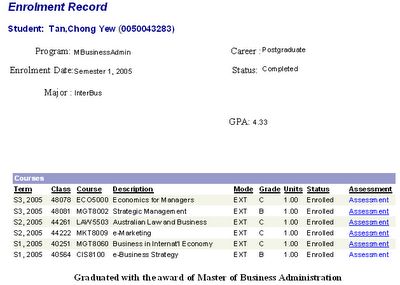
I am finally Graduated from University of Southern Queensland Australia!!!! "Award of Master of Business Administration", though the result is not in fancy look with only Bs & Cs, but it indicated my two years hard work; working and studying at the same time, juggling with my busy schedule. "I have finally Made it though...and ready for the next phase"..
Dr.Prince
Wednesday, March 01, 2006
Prince: Face Change...
With the emerging Generation Y, with their youthful and energetic personality, has marked a different value in society. They went through a different education system, moulding their thinking towards a wider perspective. They believe that as long as they abide by the 3 layman rules, they can then enjoy their freedom; however, they have forgone the morality perspective.
The 3 rules:-
-As long as it does not interfere the freedom of other
-As long as it does not cause harm on others
-As long as it is legally & morally acceptable
The movie talk-show was discussing about cosmetic surgery of changing a person face, and mostly, the Generation Y who rushes for a face-change due to their society belief.
The advancement of technology has given human being a quantum leap in modern development, and it has also made everything possible. Anyone can now own a celebrity face as long as they afford to pay.
It is neither about simple cosmetic surgery of removing nor correcting a facial structures, but it is an 12 hours to 16 hours, which involves a system approach operation to totally-change a human face to another new face.
Imagine you seeing two, or hundred of ‘Brad Pit’ walking in the street; may be Angelina Joliet, Jennifer Aniston or any other well-known celebrity, and money is the only concern.
The show is neither one that against nor support the cosmetic surgery of face-changing, but a discussion brings about the pro and cons; what catch him the most was the ending statement made by the host.
‘Every human owns ‘two-faces’ which is you outer face and you inner ‘face’. It doesn’t matter how you change you outer look, but if you inner face (attitude) remain the same, you are still who you are. Do remember that the inner face creates the ‘value’ for your outer face’, said the host.
The 3 rules:-
-As long as it does not interfere the freedom of other
-As long as it does not cause harm on others
-As long as it is legally & morally acceptable
The movie talk-show was discussing about cosmetic surgery of changing a person face, and mostly, the Generation Y who rushes for a face-change due to their society belief.
The advancement of technology has given human being a quantum leap in modern development, and it has also made everything possible. Anyone can now own a celebrity face as long as they afford to pay.
It is neither about simple cosmetic surgery of removing nor correcting a facial structures, but it is an 12 hours to 16 hours, which involves a system approach operation to totally-change a human face to another new face.
Imagine you seeing two, or hundred of ‘Brad Pit’ walking in the street; may be Angelina Joliet, Jennifer Aniston or any other well-known celebrity, and money is the only concern.
The show is neither one that against nor support the cosmetic surgery of face-changing, but a discussion brings about the pro and cons; what catch him the most was the ending statement made by the host.
‘Every human owns ‘two-faces’ which is you outer face and you inner ‘face’. It doesn’t matter how you change you outer look, but if you inner face (attitude) remain the same, you are still who you are. Do remember that the inner face creates the ‘value’ for your outer face’, said the host.
Prince: Finally...
‘After 2 years of hard-work, I finally graduated!’
‘I do not deny it is tough to work and study at the same time, juggling with your time to spend with your family, girlfriend, Colleagues, Best friends, and personal leisure; coupled with Over-time working in office; the pressure is lethal amount.’
‘However, here it comes again the dilemma; the depression stage of mine. Dipping in the world of pressure has hardened my experience, strengthen my personality, improve my self-behaviour; but after I received my result, knowing that I am able to graduate; I feel a sudden disappointment.’
‘The reason is because, I have finally gone through my MBA, and I am no longer felt the challenge at this stage anymore, and I need to move on as soon as possible before I am softened!’
‘I lust for challenge and pressure, and of course, my PhD… which will come later this year…..’ grinned with approval.
USQ – MBA - Remark:
Personally, USQ has a good support system, and lecturers and students are encouraged to speak to each others online. They will give each student a password and logging name, so that you can create your own email, read announcement and conferencing with your lecturers.
We do not need to submit thesis, which is one good thing about USQ, However, we need to write assignment and prepare for exam. In order to control their quality and ensure all rounded students, they change the exam rule when I first joined, ‘shit! It is tougher since then’
The sulky thing is that you have to pass assignment and exam both in order to pass the subject, and passing rate is 50% of total mark, they do not allow student to average their mark.
Sometimes, an assignment may not cost you 20% and exam is 80%. Imagine you score in exam (80%), but fail your assignment (<10%). You are still considered as FAIL even though it is only consist of 20% of the overall marks!
‘I do not deny it is tough to work and study at the same time, juggling with your time to spend with your family, girlfriend, Colleagues, Best friends, and personal leisure; coupled with Over-time working in office; the pressure is lethal amount.’
‘However, here it comes again the dilemma; the depression stage of mine. Dipping in the world of pressure has hardened my experience, strengthen my personality, improve my self-behaviour; but after I received my result, knowing that I am able to graduate; I feel a sudden disappointment.’
‘The reason is because, I have finally gone through my MBA, and I am no longer felt the challenge at this stage anymore, and I need to move on as soon as possible before I am softened!’
‘I lust for challenge and pressure, and of course, my PhD… which will come later this year…..’ grinned with approval.
USQ – MBA - Remark:
Personally, USQ has a good support system, and lecturers and students are encouraged to speak to each others online. They will give each student a password and logging name, so that you can create your own email, read announcement and conferencing with your lecturers.
We do not need to submit thesis, which is one good thing about USQ, However, we need to write assignment and prepare for exam. In order to control their quality and ensure all rounded students, they change the exam rule when I first joined, ‘shit! It is tougher since then’
The sulky thing is that you have to pass assignment and exam both in order to pass the subject, and passing rate is 50% of total mark, they do not allow student to average their mark.
Sometimes, an assignment may not cost you 20% and exam is 80%. Imagine you score in exam (80%), but fail your assignment (<10%). You are still considered as FAIL even though it is only consist of 20% of the overall marks!
Prince: Since then...
Still remember when I was 13 year-old, I was sent to a national secondary school near my house then. Growing up in a small family, which merely enough to survive; I do not receive much allowance; RM 1 a day, or less.
Admiring those rich kids with red eye, they spent like ‘water flowing out of the tap’, while I have to save like ‘Squeeze-to-wrinkle-empty-plastic-bag’. I know it is not going to be enough to spend, and I found the solution; working part-time!
It was when I was recruited as an apprentice, working in a shattered bread factory, earned merely RM 3 per afternoon; from 2pm to 6pm; sometimes until 8pm.
It is more than obvious, the proprietor was depriving our benefit; taking advantage of our ignorance & innocence. We were made to carry bags of flour weighed 25kg per bag every evening before we were allowed to go back; and 50kg sugar as to prepare for tomorrow operation.
Regardless of all the hard work, I was happy that I was able to make a lot friend, and learned a lot about human greed and temptation. There was an old man working in the factory, once told me, ‘You shouldn’t worry about the starting, but you should be more worry about the ending of our life!’
He also told me that, ‘It doesn’t matter an A or a D, but it does matter if you can make it to the end; as long as you work and learn hard enough, and one day you will earn more than that, of course, not in this place!’.
One day the boss’s brother, who is religious person, told me, ‘Living poor is nothing, but living with no value is a disgrace. It doesn’t matter if you fail your exam, or make a mistake in your homework, or anything that you do not do well, as long as you have a heart to do it again and again, you will get it right sometime, the process is the value!’
He related his experience, ‘I used to spend a lot in exercise-book, because I tend to make a lot of mistake in writing, and was punished to re-write 100 words, sometimes 1000 words. However, I never stress myself, ‘they ask me to write- I write; in the process, I learn; another 1000 times more than other about the word.’
>>>>>>>>>>>>>>>>>>>>>>>>>
When I was 14 year-old then, moving into form 1, I was with the bread factory until the long holiday when my uncle approached me. He recruited me as a Sale Assistant in his supermarket in Sungai Petani, earning RM 2.50 per hours, monthly income around RM 450, but I was only able to work for 2 months in Holiday.
Believe it or not, I was working illegally in the market, because the legal age is 16. I was lucky enough to have an Uncle working as the General Manager who covered everything up for me. My first department was Sport Department; due to my age, I was sent to Sport Department because it was the smallest department with less in touch with customer.
The supervisor was an Indian Lady, treating me harshly; perhaps, she thought I was a spy then. But there’s one thing I learn from her when she was explaining to the customer about weight lifting equipment.
The customer lifted the equipment, and asked, ‘Would that be too light?’
‘Nothing is light if you train long enough’, said my supervisor, she continued, ‘When you lifted it up and down for the first few times; it is light, but after some time, you start to feel exhausted and weary.’
What I have learnt…
‘When you are pushing something too far, too fast, it will create negative impact’
‘When you are persevere in your job, time will prove your experience; of course, you need to have the heart to learn it’
>>>>>>>>>>>>>>>>>>>>>>>>>>>>>>>>>>>>
I returned home after the holiday, I was then worked for the bread factory again (due to my age, I wasn’t allowed to work in local Supermarket unless my Uncle was a General Manager!)
Approaching Holiday, I started to pack my stuff, and ready to move to Sungai Petani again; this year, I was placed under Hardware Department. I still remember my supervisor was ‘Rosli’, a young and kind Malay Chap.
Everyone in the department did not have the ball to talk with my Uncle, still remember, there was one time, one of the staff would like to transfer department, and she met my Uncle for the discussion. My Uncle approved her application eventually.
She bragged, ‘Sometimes, you need to speak out in order to get thing done. Being afraid is just avoiding the problem; right or wrong doesn’t matter because you will know at the end.’
>>>>>>>>>>>>>>>>>>>>>>>>>>>>>
At age 16, I applied for Part-time sale-assistant in Sentosa supermarket in Alor Setar, and was sent to Canned Food Department. My supervisor was Mr. Tan, a 30 year-old Chinese Chap. He briefed me on my first day, ‘If they pay you RM 500 a month, they expect you to work double, or triple for them- May be more. Only then, the company is willing to keep you, maintain you and promote you or giving you increment; so I expect you to work hard in this department!’
Until end of the year - right after my PMR, I moved on to Sungai Petani to work with my Uncle again, and this year I was placed under Sundry Department. I learn even more this year, perhaps, too many events were occurring in the market.
There was a couple entering a washroom together, and was spotted by one of the staff. The news went straight to my Uncle, and the couple was called to the office. My Uncle related his experience in questioning the couple, ‘All I need to do is look into their eye, and then I shall know if they are lying. Question after questions, they finally admitted, and willing to leave for good.’
Another issue was about my assistant Supervisor, who planned to resign for greener pasture; was having an argument with his wife too. All bad fortune came in once- as he believed, and he was frustrated, since he was going to leave anyway; he became sluggish and slack in his work, careless about his responsibilities. My Uncle called him up, and managed to push him.
‘Anyone is willing to listen to you as long as you are morally right, speaking the true in the society. I told him what he did is wrong, and give him the reasons, there is no reason why he doesn’t want to listen to me, or being stubborn in his own act.’ My uncle explained to me when I asked him in the car.
That tells me that as long as you know they have done wrong, and tells them the truth of being right. There’s no reason why a rational human being should work against it.
I asked my Uncle that time, as I still remember, ‘What if he doesn’t want to listen to you and keep on with his bad attitudes?’ My Uncle told me, ‘I will fire him’
I was then only 16, and was shocked and afraid to hear the work ‘firing’, perhaps, I was inexperienced…
>>>>>>>>>>>>>>>>>>>>>>>>>>>>>>>>>>>>>>
Admiring those rich kids with red eye, they spent like ‘water flowing out of the tap’, while I have to save like ‘Squeeze-to-wrinkle-empty-plastic-bag’. I know it is not going to be enough to spend, and I found the solution; working part-time!
It was when I was recruited as an apprentice, working in a shattered bread factory, earned merely RM 3 per afternoon; from 2pm to 6pm; sometimes until 8pm.
It is more than obvious, the proprietor was depriving our benefit; taking advantage of our ignorance & innocence. We were made to carry bags of flour weighed 25kg per bag every evening before we were allowed to go back; and 50kg sugar as to prepare for tomorrow operation.
Regardless of all the hard work, I was happy that I was able to make a lot friend, and learned a lot about human greed and temptation. There was an old man working in the factory, once told me, ‘You shouldn’t worry about the starting, but you should be more worry about the ending of our life!’
He also told me that, ‘It doesn’t matter an A or a D, but it does matter if you can make it to the end; as long as you work and learn hard enough, and one day you will earn more than that, of course, not in this place!’.
One day the boss’s brother, who is religious person, told me, ‘Living poor is nothing, but living with no value is a disgrace. It doesn’t matter if you fail your exam, or make a mistake in your homework, or anything that you do not do well, as long as you have a heart to do it again and again, you will get it right sometime, the process is the value!’
He related his experience, ‘I used to spend a lot in exercise-book, because I tend to make a lot of mistake in writing, and was punished to re-write 100 words, sometimes 1000 words. However, I never stress myself, ‘they ask me to write- I write; in the process, I learn; another 1000 times more than other about the word.’
>>>>>>>>>>>>>>>>>>>>>>>>>
When I was 14 year-old then, moving into form 1, I was with the bread factory until the long holiday when my uncle approached me. He recruited me as a Sale Assistant in his supermarket in Sungai Petani, earning RM 2.50 per hours, monthly income around RM 450, but I was only able to work for 2 months in Holiday.
Believe it or not, I was working illegally in the market, because the legal age is 16. I was lucky enough to have an Uncle working as the General Manager who covered everything up for me. My first department was Sport Department; due to my age, I was sent to Sport Department because it was the smallest department with less in touch with customer.
The supervisor was an Indian Lady, treating me harshly; perhaps, she thought I was a spy then. But there’s one thing I learn from her when she was explaining to the customer about weight lifting equipment.
The customer lifted the equipment, and asked, ‘Would that be too light?’
‘Nothing is light if you train long enough’, said my supervisor, she continued, ‘When you lifted it up and down for the first few times; it is light, but after some time, you start to feel exhausted and weary.’
What I have learnt…
‘When you are pushing something too far, too fast, it will create negative impact’
‘When you are persevere in your job, time will prove your experience; of course, you need to have the heart to learn it’
>>>>>>>>>>>>>>>>>>>>>>>>>>>>>>>>>>>>
I returned home after the holiday, I was then worked for the bread factory again (due to my age, I wasn’t allowed to work in local Supermarket unless my Uncle was a General Manager!)
Approaching Holiday, I started to pack my stuff, and ready to move to Sungai Petani again; this year, I was placed under Hardware Department. I still remember my supervisor was ‘Rosli’, a young and kind Malay Chap.
Everyone in the department did not have the ball to talk with my Uncle, still remember, there was one time, one of the staff would like to transfer department, and she met my Uncle for the discussion. My Uncle approved her application eventually.
She bragged, ‘Sometimes, you need to speak out in order to get thing done. Being afraid is just avoiding the problem; right or wrong doesn’t matter because you will know at the end.’
>>>>>>>>>>>>>>>>>>>>>>>>>>>>>
At age 16, I applied for Part-time sale-assistant in Sentosa supermarket in Alor Setar, and was sent to Canned Food Department. My supervisor was Mr. Tan, a 30 year-old Chinese Chap. He briefed me on my first day, ‘If they pay you RM 500 a month, they expect you to work double, or triple for them- May be more. Only then, the company is willing to keep you, maintain you and promote you or giving you increment; so I expect you to work hard in this department!’
Until end of the year - right after my PMR, I moved on to Sungai Petani to work with my Uncle again, and this year I was placed under Sundry Department. I learn even more this year, perhaps, too many events were occurring in the market.
There was a couple entering a washroom together, and was spotted by one of the staff. The news went straight to my Uncle, and the couple was called to the office. My Uncle related his experience in questioning the couple, ‘All I need to do is look into their eye, and then I shall know if they are lying. Question after questions, they finally admitted, and willing to leave for good.’
Another issue was about my assistant Supervisor, who planned to resign for greener pasture; was having an argument with his wife too. All bad fortune came in once- as he believed, and he was frustrated, since he was going to leave anyway; he became sluggish and slack in his work, careless about his responsibilities. My Uncle called him up, and managed to push him.
‘Anyone is willing to listen to you as long as you are morally right, speaking the true in the society. I told him what he did is wrong, and give him the reasons, there is no reason why he doesn’t want to listen to me, or being stubborn in his own act.’ My uncle explained to me when I asked him in the car.
That tells me that as long as you know they have done wrong, and tells them the truth of being right. There’s no reason why a rational human being should work against it.
I asked my Uncle that time, as I still remember, ‘What if he doesn’t want to listen to you and keep on with his bad attitudes?’ My Uncle told me, ‘I will fire him’
I was then only 16, and was shocked and afraid to hear the work ‘firing’, perhaps, I was inexperienced…
>>>>>>>>>>>>>>>>>>>>>>>>>>>>>>>>>>>>>>
Subscribe to:
Posts (Atom)

